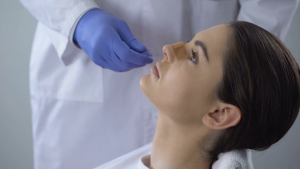Rhinoplasty surgery has a very high degree of patient satisfaction in the US, but it has a lengthy healing period, therefore people who undergo this surgery must be patient in awaiting their final results. There is no one size fits all Rhinoplasty and every patient is unique. For this reason, changes in the short or medium recovery term after Rhinoplasty can vary greatly from one patient to another. In this article, we will review the changes and useful strategies to be taken during the postoperative period for rhinoplasty.
The postoperative period of a Rhinoplasty can be divided into:
- Immediate postoperative: The first two weeks after surgery.
- Mediate postoperative: Three weeks to four months after surgery
- Late postoperative: Four months to one year after surgery
Immediate postoperative care
 Once the surgery is complete, you will be placed in a recovery room. Your discharge from the hospital or rhinoplasty Michigan surgery center may occur that same afternoon or the following morning depending on the complexity of your rhinoplasty and how you recover from surgery.
Once the surgery is complete, you will be placed in a recovery room. Your discharge from the hospital or rhinoplasty Michigan surgery center may occur that same afternoon or the following morning depending on the complexity of your rhinoplasty and how you recover from surgery.
Your Michigan cosmetic surgery specialist will then prescribe analgesics, anti-inflammatories, and a gastric protector. Analgesics will control any discomfort that may arise after surgery; They are usually mild and last up to 48 hours. It is recommended to rest and apply cold compresses on the eyelids to relieve pain and prevent bleeding. After surgery, inflammation may appear around the eyes. This is normal and may increase in the following days. After forty-eight hours, these side effects improve gradually until they disappear in seven to ten days.
The plugs are usually removed in the first 24 hours if septoplasty has not been performed and between two and seven days if the septum has been corrected. It is very important to maintain strict hygiene inside the nose. Using swabs dipped in hydrogen peroxide will help to clean the wound of the columella and prevent crusts from accumulating in the nostrils. The use of saline or saltwater to clean the nostrils will prevent blockages from mucus or blood that impede breathing.
The plaster is removed after seven or eight days, then strips of plaster or another type of splinting will be used if your rhinoplasty Michigan surgeon finds it necessary.
Once the plaster and plaster strips have been removed from the back, there may be a degree of residual inflammation and bruising. It is also possible that the nose has a distorted appearance and the tip is somewhat higher, however, the patient must remain calm as this usually disappears in a few weeks.
Mediate postoperative care
 During this period, the healing process has already started and the nose starts to become less and less inflamed each day. This period is especially important because it is necessary to monitor how the inflammatory reaction has evolved.
During this period, the healing process has already started and the nose starts to become less and less inflamed each day. This period is especially important because it is necessary to monitor how the inflammatory reaction has evolved.
The sutures must have fallen completely by day 15. If they have not fallen, they must be removed to prevent the formation of inclusion cysts which can cause slower or defective healing.
If the inflammation is taking place in a homogeneous way and at a good pace, there is nothing you need to do. If certain areas tend to retain inflammation such as the back of the nose or above the tip, strips of tape can be used to resolve this condition.
If it does not improve, your Michigan plastic surgery specialist may resort to the use of corticosteroids to control the inflammation. Properly used corticosteroids can reverse scar or inflammatory problems, especially at the tip of the nose, but they can also cause additional problems if not used properly.
Towards the end of the 3rd or 4th month, the back of the nose should be deflated, the tip should be softer and the mobility of the nose (and face) will feel more natural. Short-term changes after Rhinoplasty are often stressful because they do not reflect the final outcome of the surgery and patients tend to become worried.
From a functional point of view, breathing may be challenging during the first 15 days due to internal inflammation suffered as a result of treatment to the nasal septum. After the second or third week, breathing is normalized, although slight difficulties may remain for three or four additional weeks.
Late postoperative care
Changes in the late postoperative period take place after the fifth month and are characterized by several factors:
- Changes are slower and less evident.
- The size of the nose will undergo a few changes.
- The definition of the nasal silhouette begins.
- Irregularities that were hidden after the inflammation may be revealed.
Medium-term changes after a Rhinoplasty in Michigan will occur slowly over the next six months and may extend until the 12th – 18th postoperative month. Throughout this period, several visits with your surgeon will be scheduled to confirm that you are happy with the results of your surgery.
 On the eighth or ninth month, swelling should have decreased by approximately 80-90% and you will be able to tell what the final look of your nose will be. However, that residual 10-20%, which will disappear within four or six months, can produce very noticeable changes (generally positive).
On the eighth or ninth month, swelling should have decreased by approximately 80-90% and you will be able to tell what the final look of your nose will be. However, that residual 10-20%, which will disappear within four or six months, can produce very noticeable changes (generally positive).
Unfortunately, not all postoperative progressions are 100% accurate and small irregularities may appear that need to be resolved by an additional touch up procedure. The most frequent are small irregularities in the back or tip caused by splinters, movements or deformations of the cartilage or grafts during recovery. This type of retouching does not mean a “new rhinoplasty” since they are usually minor interventions performed under local anesthesia and do not require plaster or post-operative care nearly as long as the additional procedure.
As a rule, it is accepted that changes after Rhinoplasty surgery are usually complete after 12 to 18 months. In particular situations such as thick skin noses or complex reconstructions, the healing process can take up to two years to complete.
Final thoughts and choosing a surgeon
When undergoing any cosmetic procedure it is critical that your surgeon is highly experienced and hold a strong track record for success. An inexperienced surgeon can leave you feeling extremely self-conscious about your results, and or even worse off than before. Rhinoplasty surgery, either for aesthetic reasons or out of medical necessity is both a procedure and an art. Properly designing a symmetrical yet natural looking nose is something surgeons can often struggle with, making it a job best done by an expert.
Looking for the best rhinoplasty surgeon in Michigan? At SurgeonGate, we connect people just like you with heavily experienced and highly trained surgeons. Request a consultation today and a local rhinoplasty specialist will reach out to you as soon as possible, ensuring you leave feeling happy, confident and fully expressive. Check out our nose reshaping blog for more useful articles!
The post Michigan Rhinoplasty recovery and post-op care appeared first on SurgeonGate.
source https://umassmedicalschool.com/2019/02/23/michigan-rhinoplasty-recovery-and-post-op-care/
No comments:
Post a Comment